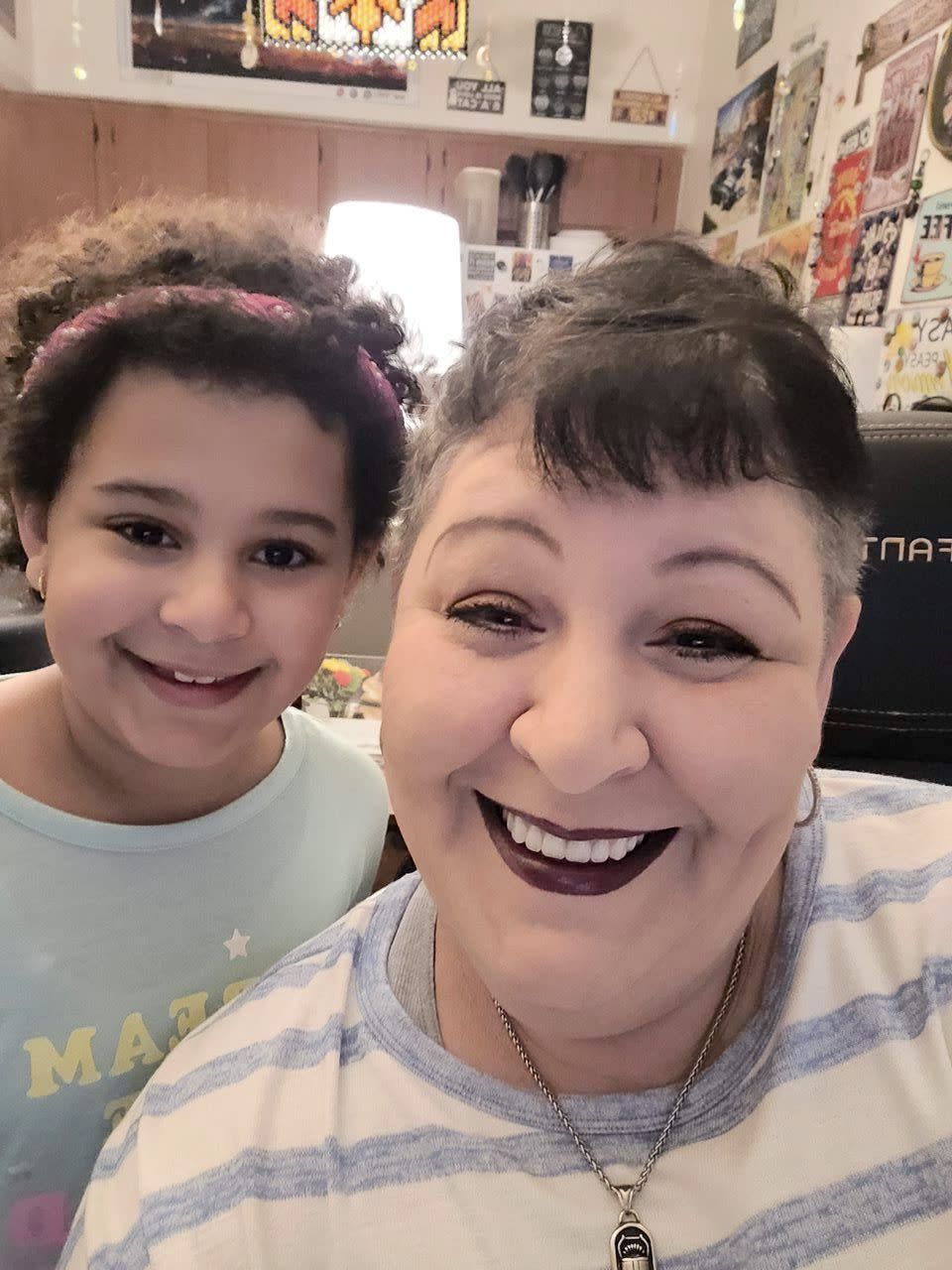How Having a Heart Attack Transformed My Outlook on Life

"Hearst Magazines and Yahoo may earn commission or revenue on some items through these links."
Lorraine Hall is not a LEQVIO patient and has been compensated to share her story. Continue reading for safety information.
Before dawn one morning in February 2019, Lorraine Hall woke up with excruciating pain across her chest and left arm. As it radiated up her neck and coursed through her face, she suspected that she was having a heart attack.
“All I was thinking about was that I didn’t want to alarm my husband and my daughter. That was the only thing I could control at the moment,” she recalls. “I was very scared that I wasn’t going to make it. This experience showed me that I needed to really take control of my health.”

Luckily, Hall quickly got the medical care required and was able to survive her heart attack. “There wasn’t too much time between my cardiac event and speaking to my cardiologist,” Hall recalls. “We had a discussion at the hospital about the medications I was given after the event. Then during a follow-up three days later we discussed options of cardiac rehab and my treatment plan.”
Emerging from this harrowing event with a newfound dedication to her cardiovascular health, she started to make a series of changes to protect her heart. Speaking to Prevention, Hall shares the ups and downs of this experience and how she remains committed to her heart health.
Learning what was behind her heart attack
The first step toward improving her heart health was understanding what had caused her event in the first place. Hall was surprised by what her doctor told her. “My cardiologist explained to me that my LDL-C (which stands for low-density lipoprotein cholesterol, also known as the bad cholesterol) had contributed to my heart attack. Elevated levels of LDL-C had caused plaque to build up on my left anterior descending artery (LAD), and that contributed to my heart attack,” she recalls.
Hall’s elevated levels of LDL-C were not presenting with any symptoms to indicate a health problem, and she was unaware of the significant impact it had on her heart health. “It is this inability to see or feel elevated levels of LDL-C that makes it so dangerous,” according to Stephanie Saucier, MD, a cardiologist specializing in preventative cardiology, who is not a part of Hall’s care team.
“One of the most significant contributors to heart disease is consistently high levels of LDL-C in the blood,” Dr. Saucier says. “Untreated, elevated LDL-C leads to the buildup of plaque on the walls of the arteries, which can lead to an event like a heart attack or stroke.” Any heart attack can be deadly without emergency action—underscoring how lucky Hall was to survive her event.
“For an individual who has recently experienced a cardiac event—or even a procedure like a cardiac revascularization that helps restore blood flow to the heart—one of the most important things they can do is urgently manage their LDL-C with a goal of lowering their LDL-C,” Dr. Saucier emphasizes.
Managing her cholesterol
Following her event, Hall and her cardiologist began closely monitoring her LDL-C level. “I paid attention to my lipid panels in an entirely new way,” she says. Lorraine started working on ways to manage her LDL-C level, which were recommended to her by her cardiologist.
First, she made lifestyle changes to help manage her cholesterol levels. “I was doing a lot of walking, but I also tap dance, and I ended up really embracing dancing as a form of exercise,” she says. “I also taught my daughter how to dance, so we could be active and have fun together.” Including her daughter in her physical activity keeps her motivated, and she feels more energetic and uplifted than she was before her heart attack in 2019.
Hall also made nutritional shifts to try to improve her LDL-C. “This was difficult because I’m Italian and Irish, so I like to cook and I love to eat, but many of my food choices weren’t helping my heart,” she says. “Now I focus on eating more fish and vegetables.”
She also takes a daily statin to further support lowering her LDL-C. These changes helped Hall’s overall sense of well-being, she says—but her LDL-C management is still a work in progress. “I feel much better about my outlook on life and the future of my health, but despite my best efforts, my numbers remain higher than where my cardiologist would like to see them,” she says.
A cardiologist’s guidance
“Unfortunately, Lorraine’s experience is fairly common,” says Dr. Saucier. “Up to 80% of people who make lifestyle changes and take statins to lower their bad cholesterol are unable to achieve the recommended LDL-C target of 70 mg/dL or lower in high risk patients.” Additionally, she notes that “it can be easy to let LDL-C management fall to the wayside because you don’t feel the impact of elevated LDL-C until it’s too late—once you’ve had a major cardiac event or underwent a procedure to relieve blockage.”
Getting patients to commit to managing their LDL-C—especially those patients who’ve recently experienced a heart event—is one of Dr. Saucier’s top priorities in helping people lower their risk of cardiovascular events. “I prioritize having a conversation with patients as quickly as possible following a cardiac event or procedure around their treatment plan. For the patients who continue to struggle to lower their bad cholesterol despite lifestyle changes and statins, I oftentimes recommend LEQVIO.”
LEQVIO® (inclisiran) is an advanced lipid-lowering therapy, meaning it supports the lowering of LDL-C when statins and lifestyle changes are not enough. LEQVIO works with the liver's natural processes and can help lower LDL-C by 50%. It is not known if LEQVIO can decrease problems related to high levels of bad cholesterol, such as heart attacks or stroke.
LEQVIO is administered by a health care provider twice-yearly (after two initial doses) and keeps LDL-C low through each six-month dosing interval. “The in-office administration is a benefit for many of my patients as they are already coming to see me bi-annually. It fits easily into their lifestyle and our care plan.”
“An important part of managing LDL-C is working with your health care provider to find a treatment that will work for you; I encourage patients to have regular conversations with their doctors about their treatment regimen,” says Dr. Saucier.
Looking ahead
The journey to lowering bad cholesterol isn’t always simple, but no one needs to do it alone. People who are embarking on the journey to manage their high LDL-C, despite making recommended changes (like lifestyle changes and statin therapy) should talk to their health care provider about their treatment options and whether LEQVIO might be right for them.
Despite the support, trying to improve heart health can have its ups and downs as Hall knows firsthand. No matter how hard things may seem in the moment, she doesn’t give up. It isn’t an option for her. “I always give my heart and my health everything I have,” she says.
To learn more about LEQVIO, visit www.leqvio.com.
What is LEQVIO?
LEQVIO (inclisiran) is an injectable prescription medicine used along with diet and other cholesterol-lowering medicines in adults with high blood cholesterol levels called primary hyperlipidemia (including a type of high cholesterol called heterozygous familial hypercholesterolemia [HeFH]) to reduce low-density lipoprotein (LDL-C) or “bad” cholesterol.
IMPORTANT SAFETY INFORMATION
The most common side effects of LEQVIO were: injection site reaction (including pain, redness, and rash), joint pain, and chest cold.
These are not all the possible side effects of LEQVIO. Ask your health care provider for medical advice about side effects. You are encouraged to report negative side effects of prescription drugs to the FDA.
Visit www.fda.gov/medwatch, or call 1-800-FDA-1088.
Please click here for LEQVIO full Prescribing Information.
Novartis Pharmaceuticals Corporation
East Hanover, New Jersey 07936-1080
©2024 Novartis 1/24 373669
You Might Also Like

